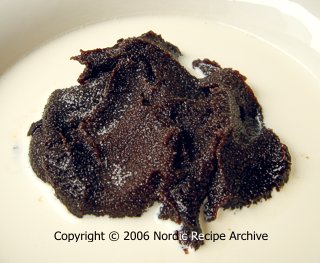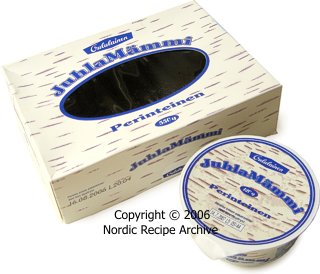
|
|
| MAIN RECIPE PAGE |
|
|
MÄMMI
In picture on left: mämmi with cream and sugar. Mämmi is made with a mixture of water, rye flour and powdered rye malt, seasoned with salt and dried, powdered Seville orange peel. The mixture goes through a slow, natural sweetening process and is finally baked in oven until set. These preparations take many hours, and after baking, mämmi may yet be stored chilled for 3 to 4 days before being ready to eat. Instead of being allowed to sweeten naturally, commercially made mämmi is usually seasoned with dark molasses — an abhorrence to mämmi purists.
In picture on right: commercially made mämmi is sold packed in containers of varying sizes. Eaten as a Lenten dish, in its origin mämmi is thought to be an equivalent to the unleavened matzo bread of the Jewish Passover. In Easter time, it was the main dish eaten on Good Friday, when one should abstain from household duties and cooking, and only have a simple, cold meal. In spite of its rather unappealing appearance and distinctive flavour, mämmi is still a part of Finnish Easter, eaten cold as a dessert with cream or half-and-half and perhaps a sprinkle of sugar on top. For the information of those who are puzzled about what mämmi tastes like — its malty flavour somewhat resembles the Irish beers Guinness or Murphy's Irish Stout, being only slightly sweeter and thicker in consistency :-) |
|
|
 Mämmi is undoubtedly the most unusual and unique of the traditional
Mämmi is undoubtedly the most unusual and unique of the traditional  Mämmi is an ancient dish of the southwestern region of Finland, where it has been eaten from ever since the 13th century, when Finland still was a Roman-Catholic country and a part of Sweden.
Mämmi is an ancient dish of the southwestern region of Finland, where it has been eaten from ever since the 13th century, when Finland still was a Roman-Catholic country and a part of Sweden.